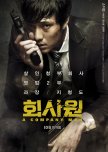
Poetic Justice
Avalanche truly is an underrated gem and I’m so glad to have come across it right here on MDL. From the J-dramas I’ve seen recently, this one certainly ranks as one of the better productions and is fully deserving of more attention as well as international viewership. In fact, it probably should have its own slot on the major distribution sites such as Netflix or Disney+.It shares a similarly-themed premise in the mould of Taxi Driver, Leverage, Bad Guys and many others, with a story that focuses on a team of vigilantes taking it upon themselves to deliver justice where the local enforcement and judiciary have failed. In this case, it gets a little more complicated than that. Although based on an episodic format, the separate cases that involve an unhealthy dose of social injustice are inextricably linked to the grand scheme of things - political conspiracy of the highest order where the upper echelons of the Japanese government are mired in corruption amidst the nefarious schemes of a powerful individual. The vigilantes are not merely performing good deeds out of the kindness of their hearts for they truly embody the spirit of Team Avengers, with a hint of subversion. As victims of conspiratorial collateral damage themselves, they are seeking to right the wrongs that had been inflicted upon them.
The drama is a co-production between Kansai Television Co. and reputable production house Tristone Pictures, and was broadcast by both Kansai TV and its affiliate, Fuji TV. It also represents a revival of Kansai TV’s “Monday Night 10pm serial drama” format, being the first drama to be aired on this time slot since 1996.
Avalanche is co-directed the cinematographer-screenwriter-director and multiple award-winning Fujii Michihito (Shinbun Kisha, Fuujinshi, 100-manen no Onna-tachi), the experienced Miyake Yoshishige and the young director Kento Yamaguchi. The story is based on the original screenplay written by Amane Marumo, Masaaki Sakai (Red Eyes: Kanshi Sousa-han), Aya Takei, Natsumi Kakesu, Michihito Fujii, Takeshi Aoshima (dele), and Kazuhisa Kodera (Shinbun Kisha, The Naked Director 2). The contemporary synth-pop rock theme song, also titled Avalanche, is performed by the Japanese 6-member rock band UVERworld.
What I Liked
In terms of the technical execution, this drama looks very much like a premium subscription network production rather than a free-to-air TV offering. The high production values along with the exceptional qualities of cinematic colour grading, direction, acting, art direction and set designs, cinematography, post-production editing, scene transitions, special effects, accompanying music score and action choreography appear very sleek and well rendered indeed.
From the storytelling perspective, this vibes very much like a US production, IMHO. The direct and no-nonsense storytelling approach, the thematic depth of the narrative and characterizations, the balance between slowburn intensity, high-octane action and delicately fragile moments, while even the conceptual visuals of the title sequence are all reminiscent of series like Homeland and The Americans. I was particularly impressed with the multiple plot twists towards the business end of the drama that were totally unexpected.
The cast performances in this production are top-tier. I was particularly impressed with Ayano Go and Kimura Yoshino who portrayed the leads, Habu Seiichi and Yamamori Michiyo respectively. Each character demonstrates a comprehensive gamut of emotional intensity while I also appreciated the subtly measured and nuanced manner of the depiction. You will not find any trace of hysterical over dramatic acting in this show, which is a huge plus point for me. The ever charming and versatile Watabe Atsuro stars as the antagonist this time and he convinces as the charismatic and suave politician, Oyama Kengo. Although credited as a supporting character with limited screen time, he certainly exudes a sufficiently villainous aura to make his presence felt.
Takahashi Maryjun as the ex-special forces operative Akashi Rina, Chiba Yudai playing the genius hacker Makihara Taishi, and Fukushi Sota’s Saijo Eisuke are the other protagonists that intrigued me with their rather significant character arcs in the story. I did find Yamanaka Takashi’s super efficient CIRO investigator Kirishima Yuji to be a very interesting side character as well.
What Fell Short
The conclusion to the story feels rushed and somewhat undercooked, IMHO. The wheels begin turning towards the final arc in episode 8 with a dramatic turn of events but eventually culminating in an unsatisfactory end for nearly everyone involved, including the antagonists.
Additionally, certain aspects of the crucial plot points appear surreal and ridiculous, particularly those involving the Prime Minister and his rather incompetent security detail. The Japanese head of state is in dire need of a qualified entourage of bodyguards if the depiction in this drama is anything to go by.
Final Thoughts
Despite the lacklustre ending, Avalanche remains overall a very well crafted and high quality production. A sequel is highly unlikely and perhaps not quite needed because the closure to the narrative is neatly wrapped up within this single season. As a one time watch, this was well worth the viewing experience indeed.
Esta resenha foi útil para você?

Esta resenha pode conter spoilers
Slick and engaging action drama with a stronger second half
Avalanche is one of the autumn 2021 dramas that dominated most of the reviews and polls, and for good reason. It is a smoothly-directed political action series littered with engaging scenes and a tight pacing.✦ STORY ✦
The plot isn't anything new - a group of outlaws set to expose the wrongdoings of political figures, but the series managed to level it up with tight pacing. The main aim of the group is exposed at the second half as they set to deal with the "big boss" of sorts, and this is the fun part as the series is running on adrenaline due to the chess play of the characters. The first half is the classic one-case-at-a-time, and I was almost set to believe that the procedural format will persist until the end, but episode 5 proved me wrong, to my relief. Avalanche picked up its pace at the second half, and it's even better than the first half in my opinion. The first four episodes dealt with cases that let us see into the lives of some members of Avalanche, giving insight on what made them join the group and how it affected them. As it is though, the action genre usually suffers from lacking character depth, and that's what happened here. While I'm satisfied with the storyline, I was out here wishing for more fleshing out for most of our characters, especially for Watabe Atsuro's Oyama. What I appreciate though, is how they showed the obstacles along the way, how Avalanche were beaten with these, and how they got around to pushing through despite it. The action choreography was also good for a TV drama, and the camerawork during these scenes is done well enough for the audience to follow it smoothly.
✦ ACTING/CAST ✦
The cast did good in their respective roles. Ayano Go definitely suits this genre, and the rest of the Avalanche members held off well on their own. Fukushi Souta surprised me because he actually did well as Saijo Eisuke, so props to Director Michihito Fuji for directing him well. Watabe Atsuro as the big guy opposite Avalanche did well, too, he carried the charisma and composure of Oyama with ease.
✦ MUSIC ✦
The music suit the series, in general. Nothing is too jarring, the tracks complement each scene they play in. Particular favorites are the drumming song (first heard in E01 when Yamamori called the team in) and the main theme, which is played in the opening title scene. And yeah I have to say, Avalanche has probably the most beautiful opening title scene in autumn 2021, I can't stop looping it lol.
✦ REWATCH VALUE ✦
With the revelations in the 2nd half, you're sure to keep a close eye on things upon watching the series a second time around. Nothing beats watching it the first time though, experiencing the thrills for the first time, especially when you get to the 2nd half of the story. Nevertheless, it will be fun to watch again as Avalanche tries to achieve their goal, even with all the odds against them.
Esta resenha foi útil para você?

When the villain is miles ahead of the heroes.
Saying it was not an exciting watch would be a lie. Saying it was more fun than frustrating and anxiety causing would also be a lie. It was a thrilling ride, but can I say it was enjoyable?I honestly loved all the characters that were part of the Avalanche. Perfect mix of skills and personalities. Their interactions were genuine, emotional and fun. They were the driving force that made it possible for me to finish the show. What I also liked was how I honestly questioned some of the characters’ motivations and the possibility of them betraying the team. The storytelling was strong enough to make that a realistic twist that could have happened.
Avalanche had also one of the strongest villains I have seen in a show. Truly always a few steps ahead of the team. While it was a good point about the drama at the beginning, at some point I got exhausted with how weak the heroes seemed in comparison. “Can they even win?” was a legit question I was asking myself. The stakes kept rising, and the conclusion left much to desire.
Last two episodes had many turns and twists, for me, maybe a few too many. No denying it was exciting, but a bit more exploration of the aftermath would be appreciated.
The performances were phenomenal. Watabe Atsuro as Oyama Kengo? So evil and so punchable. Great actors know how to make the audience hate them.
Ayano Go and Kimura Yoshino aced the roles. Habu was a fascinating character with so much emotional baggage and how much it affected him was all slowly revealed through the acting. On the other hand Yamamori Michiyo was a character with just as much personal stakes, yet so much harder to read. Kimura Yoshino's portrayal of the head of Avalanche could not be better.
Production wise - great. It was visually pleasing, but not over the top, where the visuals become distracting. I appreciate rather realistic blood and injuries make up.
Overall, it was a tense and thrilling show, but the unbalanced fight between the good guys and the villain made it impossible to to enjoy it at times.
Esta resenha foi útil para você?

Great Story, Rushed Ending
What really struck me about this plot, which is a typical vigilante plot, is that the Bad Guy is not dumb. The person who is the target of the vigilante group is just as smart as they are and is often one step ahead of their plans once he catches on.This is refreshing when most of the time, the political figure doesn't have a clue what as going on as one by one his subordinates get toppled. So thank you Avalanche for that.
BUT
At one point (around Ep. 8) I thought I had skipped an episode. because stuff was moving so fast I coulda got Whiplash (sorry a Will smith song just popped in my head).
The set up for season 2 is a bit weak if there is ever one.
My rating? It's a solid 8.5.
Esta resenha foi útil para você?

Esta resenha pode conter spoilers
This was a great drama. The twists just kept coming. And since I went in unspoiled, I was really shocked by some of them!I watched it mainly and mostly for Fukushi Sota. I love it when he plays Good Boys(TM). And here he played a Truly Good Boy(TM)! So righteous and, well, innocent, I would say - or maybe naive? - about how the world of big time politics worked. What I loved, though, was that a) he didn't let himself get corrupted or swayed from his path to make justice prevail and b) he didn't turn bitter, not even at the end when pretty much everyone disappointed him in one way or another, his closest people included.
Also, I wonder what that last scene with his character meant, when he heard Habu's voice. Was it just his imagination? Who knows...
This is a thriller series where the bad guy is obvious from the get-go but he's also very, very powerful and when he actually starts going after the team, he pretty much demolishes them. The second half of the drama has the team losing on all fronts and it's not until the finale that they manage to wring out some sort of a victory. But it's not a clean-cut one, in my opinion. Though they stop the evil plan of evil, they pay for it and the mastermind still doesn't pay his dues, not really.
Esta resenha foi útil para você?

Action against wrongful doings
A group of people teaming up together to exact revenge is not a new premise. What's interesting is that instead of killing their targets, Avalanche just put their dirty laundry in the media. I like that. Ayano Go is marvelous here and this is my first time seeing Watabe Atsuro as a villain.Characters and their dynamics or developments are very important in measuring how much I would enjoy a drama. Or else I won't care about the plot much. And the team has such a good bond. Though they are an organized crime group, they feel like a family. They cover each other back without question, without hesitation. They laugh together, they bicker. That helps to lighten the somber undertone this drama has. I have so much fun turning the nation upside down alongside the members.
The pace is good, albeit slightly too fast at times. The oldest team member being a naturally chaotic good amuses me to no end. I didn't expect that from him. Such a cool man from Stone Age.
Fighting scenes look fun and satisfying. Habu looks like he's come alive only for those cause usually he looks like he's burdened with the weight of his past. Though Ayano Go still retains some of his usual playfulness even as a the tortured hero archetype.
Every episode is packed with a lot of details. Along with the pace, it makes it very hard not to be glued to my screen.
Watabe Atsuro makes a very formidable antagonist. He's very quick to adjust his plan to match Avalanche movement. He even gets the group scattered around, panicking. Sometimes it feels like all hope are lost. In the end, I wish we would have gotten more reaction from him but I'm glad he's not a sore loser.
I like what they did with the format too. Part 1 is more detective work and part 2 is where the war begins. Episode 0 helps with Habu's perspective.
If there's anything that is lacking it's probably with the character Fujita, I'm not convinced of his motive. His presence cheapens the plot a bit. And I really want closure regarding him. I don't understand why Habu looks up so much to him.
I'm glad Saijo's papa and the journalist did what they needed to do.
This is more of a stream of consciousness during watching the drama, not exactly a proper review. Thank you for reading ~
Esta resenha foi útil para você?

Cool jusque d∀ns le titre
Une avalanche de testostérone vous submerge dès les premières minutes de ce drama et vous n'êtes pas près de remonter à l'air libre. Avec un Pitch très classique, dépeignant une organisation qui travaille dans l'ombre, pour punir le politicien ou l'industriel véreux, on a pourtant droit à une série remarquablement efficace. Une action rythmée, des punchlines qui font mouche et une mise en scène adulte et dynamique. Tout ceci donne de l'intérêt à une situation de départ tellement déjà vue. Ne parlons même pas du jeune flic Rooki, muté pour insubordination, dans ce service du 6e sous-sol, caché au milieu des archives. La porte, une fois ouverte, laisse apparaitre des ressources "humaines", un budget et des gadgets sans commune mesure. Extension de nos yeux, comme toujours dans cette situation, le Nouveau joue la stupéfaction face à l'illégalité, mais efficacité du groupe et serre de caisse de résonance de notre propre aberration. Et ça marche ! Même si ça a été vu 1000 fois et souvent avec des séries de très bonnes qualités encore récentes, comme Cheat ou Nana-ri no Hisho. Cependant, dans celle-ci, on passe à l'âge adulte avec un côté violent et sombre qui tranche clairement avec le côté bon enfant des sus nommés.Sans doute les acteurs n'y sont pas pour rien. Ayano Go, acteur caméléon, capable d'exceller dans les romances lunaires comme Koi no Deep, ou Frankenstein Love nous montre tout son potentiel de Bad Boy à la cool et mérite à lui seul le visionnage. Mais il n'est justement pas seul et clairement Takahashi Maryjun est l'alliée de poids qu'il ne faut pas énerver sous peine de réveiller son sang philippin nourrit au kick boxing. Si le harcèlement sexuel semble enfin être pris au sérieux dans le milieu politique en France, ses messieurs pourront s'estimer heureux de ne pas la trouver sur leur chemin. Sa pisse le sang, c'est libérateur pour les perso de la série loin de la retenue qui fait le charme de ce si calme pays (en apparence, évidement). Ces deux acteurs sonnent justes, au même titre que la très stricte Kimura Yoshino dans son rôle de Bosley des temps moderne, en recherche de justice, voir de vengeance.
En effet, c'estle propos principal le propos principal de la série. La vengeance, face au Sekusuhara ou au Powahara qui ont tourné aux drames, mais malheureusement, peut être, d'une manière un peu maladroite à force de répéter les mêmes schémas dans chaque épisode. Pour les 4 premiers, on a l'impression de vivre un jour sans fin tant ils sont construits de la même manière. Heureusement la routine est assez vite cassée. Même si, à mon sens, 5 épisodes, c'est trop long pour que l'excellent grand méchant chic Watabe Atsuro (qui d'autre ?) réagisse à la situation. Mettre à la vu de tous, par les réseaux sociaux, les travers des politiques devraient les rendre un peu plus réactif. Un manque de réalisme, comme toujours, dans ses situations, mais qui ne gâche rien. Y compris la présence de Chiba Yudai adepte des rôles de beaux gosses androgynes, qui peine un peu à convaincre en geek tourmenté.
Un casting coup de poing, une mise en scène forte, une musique du tonnerre et stressante à souhait, un Ending de Uverworld ouvrant la perspective d'un nouveau monde nettoyé de toute impureté (tu parles). Voilà une avalanche de raisons de regarder ce mont Fuji des séries d'action.
Esta resenha foi útil para você?







































